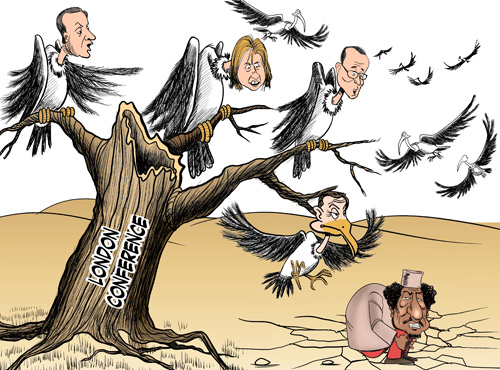Give talks a chance in Libya
|
|
|
End game in Libya [By Jiao Haiyang/China.org.cn] |
US President Barack Obama announced on Monday that NATO would take over full command of the Libya operation from Wednesday, a move apparently taken under mounting pressure from the international community and the American people. The lesson of the costly Iraq War has forced Obama to rule out the possibility of overthrowing Libyan leader Muammar Gadhafi militarily.
However, the command transfer won't change the dominant role of the United States since NATO is a US-led military alliance. Moreover, the "name change game" is the use of "smart power" by the US and gives it more room to maneuver.
The coalition forces are now targeting Libyan ground forces after having damaged the country's air force and air defense systems.
Needless to say, the coalition forces have distorted the United Nations Security Council resolution and have gone far beyond the UN mandate. That's why the US is eager to shift the blame to NATO by transferring the command.
We all know that it is impossible to avoid civilian casualties in air attacks. For example, US air attacks in Afghanistan have "accidentally" killed and injured many civilians, resulting in public indignation. Even Afghan President Hamid Karzai has protested against such air strikes. And though the US has "apologized" for the air strikes, the incidents are not yet settled.
Western countries engaged in joint attacks on Libya are using the excuse of trying to end the civil war and protect civilians to fulfill their real goal of toppling Gadhafi - even at the cost of civilian lives.
Though France and Britain led the campaign for launching a joint attack on Libya to "protect civilians", the US has been the leading player in the air strikes. Learning a lesson from his predecessor's unpopular "unilateralism", Obama has shifted to using "smart power". That's why the US has been maintaining a low profile in the Libyan operation, and emphasizing the role of the European Union and Arab countries.
Right from the beginning, many countries have opposed the attack on Libya and demanded an immediate halt to military operations. Russian Prime Minister Vladimir Putin has likened the Security Council resolution on Libya to medieval calls for crusade. China, India, Brazil and Germany, too, have opposed the military action, and abstained from voting on the UN resolution.
True, the Arab League asked the UN Security Council to impose a "no-fly" zone over Libya. But now it accuses the Western coalition forces of deviating from the original intent of the resolution. And the African Union (AU) high-level ad hoc committee on Libya is against any foreign military intervention in the North African country and has said it would seek an "African solution" to the problem.
The situation in Libya is different from what we saw in Tunisia and Egypt, where demonstrators took to the streets to demand the ouster of their presidents. In Libya, it's a civil war started by some ethnic groups unhappy with the government.
 0
0 








Go to Forum >>0 Comments